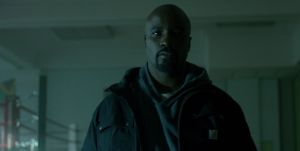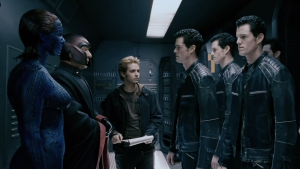
SXSW 2025 was a huge festival for horror, so much so that the lineup could’ve been mistaken for Fantastic Fest! There was plenty of genre filmmaking to go around, from the mainstream studio hits to the small indie productions, with each film addressing horror tropes in their own unique way.
Drop (Christopher Landon)
Drop (2025)- source: Universal Pictures
First is the new Blumhouse hit Drop, which is a simple, straightforward thriller largely confined in a fixed location. Though some may describe the film as a new Red Eye, the occasional drift between genuine tension and plain silliness may call to mind a different recent thriller, that of Carry-On (the 2024 Netflix hit).
Following widowed mother Violet (Meghann Fahy) on her first date in years, the majority of Drop takes place in a fancy restaurant, as Violet meets her date Henry (Brandon Sklenar) and tries to have a good time. But then Violet begins to receive these mysterious memes and texts via drop. What started off as a rude prank at first quickly escalates into a hostage situation, where Violet must protect her son while attempting to figure out who this sinister figure is.
Like many tightrope thrillers, Drop completely rests on Fahy’s ability to command the screen. Fortunately, she’s not only a terrific lead, but her chemistry with Sklenar is a constantly entertaining dance between the thriller and romantic comedy genres. We’re not quite sure whether we can trust Henry, but based on the snappy dialogue and moments of honesty, we want to like this guy and hopefully, when it comes to the plot, he would be an ally. It’s easily the glue that holds the film together, as Landon juggles a surprisingly large ensemble cast – naturally, in a murder mystery premise, you need to have enough suspects.
For a film whose premise and marketing can come off as silly and stupid, it’s a rare comforting feeling to see the film and realize the filmmakers are essentially telling you “we know, so have fun.” Landon continues his streak of delivering horror comedies, after titles like the Happy Death Day films and Freaky. As for Blumhouse, well, this is easily the same studio that gave us M3GAN, and you bet that’s a compliment. Frankly, we should be getting ten of these kinds of movies every year.
Death of a Unicorn (Alex Schwarfman)
Death Of A Unicorn (2025) – source: A24
Next is Death of a Unicorn, which sees A24 once again expanding their horizons and taking on bigger projects than before, in a similar vein to Civil War the previous year. Paul Rudd and Jenna Ortega play an estranged father/daughter pair on their way to meet a wealthy entrepreneur (Richard E. Grant) and his family at their estate. As the title bluntly suggests, the film quickly goes to shit when they accidentally hit and kill a unicorn on the road. And if that’s not enough, the rich family quickly discovers that the unicorn possesses miraculous curing powers, maybe even enough to cure cancer.
But as Dr. Ian Malcolm once said in The Lost World: Jurassic Park, “Mommy’s very angry.” That comparison is not a stretch at all here, as the film reveals early on that the unicorn our characters just killed is only a baby, and that makes for a pair of vengeful unicorn parents.
Death of a Unicorn succeeds when it embraces the creature feature subgenre. With some practical effects and a unique creature design, the unicorns are portrayed as genuine threats that can easily kill a human. Writer/director Alex Schwarfman is more than happy to give us the gnarly kills we’ve always dreamed of – getting “horned” by a unicorn has never been so gruesomely entertaining.
Where the film easily stumbles is whenever it attempts to do something satirical. Clearly, the script is making fun of this rich family. Grant gets to have some fun scenery chewing moments, while Téa Leoni plays the clueless ignorant wife and Will Poulter steals every scene he’s in as the idiot spoiled nepo baby. Though these actors each get their occasional moments of comedy, the script reduces them to the most basic of caricatures, forcing them to essentially do the same joke over and over again. It certainly gets old fast, and we’re just waiting for them to receive the appropriate fatality from our unicorn buddies. The real comedic hero here is Anthony Carrigan, playing the quiet butler who silently judges everything and everyone around him.
Death of a Unicorn is as straightforward as its title. It’s essentially the T-Rex family coming to terrorize the family in Saltburn. It’s not as smart or as sharp as it could be, but thankfully Ortega and Rudd keep the story somewhat grounded and there’s enough creature feature tropes to be enjoyed here.
Slanted (Amy Wang)
Slanted (2025)- source: SXSW Film Festival
Our last title is the winner of the Grand Jury award in the narrative feature category, Slanted. Playing like a cross between The Substance and Mean Girls, Slanted takes on Asian American identity in ways not quite explored before in other films.
Our protagonist Joan (Shirley Chen) is so eager to fit in. She came to the United States at a young age with her parents, hoping to make the most out of her new life. But the pressures of wanting to be a part of something weigh on her every day, so much so that her dream is to be named Prom Queen. To her, it’s the most important thing in the world. Being named Prom Queen means no one will get to laugh at you anymore or judge you for the color of your skin or the way you look.
This results in Joan agreeing to undergo a controversial irreversible surgery that transforms her into a white girl. For the second half of the film, Chen is replaced by Mckenna Grace, who then begins her journey of becoming accepted by the most popular girls in school, while dealing with the emotional fallout of her parents’ inability to accept this new… situation.
Writer/director Amy Wang approaches this story with a unique take on Asian American identity, that is self-inflicted cultural erasure. The issue of many Asian Americans wishing to erase their own culture in order to fit in is simply not talked about enough. It’s a unique sense of pressure that not only applies socially, but it seeps into everything you do. You think an Asian American writing a story would automatically have their fictional characters be Asian as well? Not always. Sometimes they just default to white. Because mentally, to some of us, that’s just the “default” and that’s normal.
It’s a nuanced and complicated idea that I wish Slanted explored even more of. But because we’re in a horror comedy with a ton of genre tropes, the film needs to spend a lot of time to cover the body horror plot points and the high school teenager cliches. The film then inevitably makes itself become predictable, with not enough narrative turns to surprise the audience, save for one interesting twist near the end that could’ve been unraveled (or peeled back, hah!) even further. If you’ve seen films like The Substance or Mean Girls or even Dìdi, you know where this is going to go, and it goes there.
Even the satirical bits, though occasionally funny, don’t have too much else going on thematically. When Joan first steps into the clinic that runs the controversial surgery, she’s greeted with a hilariously over-the-top commercial, where every human in the ad asks “Wouldn’t everything be easier in life if you were white?” The film would frequently come back to this joke, while touching on some admittedly funny stereotypes on white people and white families. It brings to mind Bo Burnham’s song “White Woman’s Instagram” from his Netflix special Inside, though Burnham has darker and more existential ideas underneath his parodies.
Slanted does not quite reach those compelling highs, but it’s put together with a ton of passion for the subject matter, as you can tell that this story feels largely autobiographical for Amy Wang. Shirley Chen carries the film in the first half, while Mckenna Grace steps into the second half and somehow inherits that characters’ troubles and worries so easily. Even if you can correctly guess where it’s going, the film is a showcase for an emerging voice who will undoubtedly have more interesting things to say down the line.
Does content like this matter to you?
Become a Member and support film journalism. Unlock access to all of Film Inquiry`s great articles. Join a community of like-minded readers who are passionate about cinema – get access to our private members Network, give back to independent filmmakers, and more.







